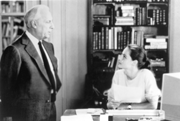Generation Gap
Editorial Prerogative: Michel Serrault dictates his memoirs to Emmanuelle Béart in "Nelly and Monsieur Arnaud."
A younger woman and an older man seek cerebral intimacy in Claude Sautet's 'Nelly and Monsieur Arnaud'
By Richard von Busack
THE OLDER woman/younger man romance will be around as long as there are aging stars and striving ingénues, but Nelly and Monsieur Arnaud offers a pleasing twist on the theme; for once, the attraction is as much cerebral as it is physical. Claude Sautet's new film reminds me of Adam Gopnick's superior correspondence from France in the New Yorker. Gopnick's latest installment concludes that the French, having given up the mission civilatrice, the civilizing mission of Empire, are now perplexed about their place in the world. In Nelly and Monsieur Arnaud, the near-elderly Arnaud, who has seen his share of French history, leaves a young person's history book to his granddaughter. He describes the book as "a mixture of chauvinism and pretty pictures." Many old men, having seen the death of a dream of enlightening the world, might have gone out trying to find release in sex; Michel Serrault's Arnaud is too wise for such folly.
Arnaud has led a distinguished double life; first as a judge and later as a businessman who "struck it rich in real estate making Paris ugly." Now, he's trying to write his memoirs. He has a computer but doesn't like to touch it, so he needs a secretary. He impulsively hires Nelly (Emmanuelle Béart), who is at loose ends, broke and owing $6,000 in back rent. As editor, sometimes friend, sometimes irritant, to the older man, Nelly becomes Arnaud's intimate, if not his lover.
Arnaud, having imagined his memoir grandly "as an initiatory story, conceived in the style of a violent defloration," is weaned in old age from his own dreams of force and solitude. Nelly, in return, gets not only some money but also some of Arnaud's strength of character to free herself from her passive nightmare of a marriage. The plotting may resemble Krzysztof Kieslowski's Red, in which a retired, corrupted judge has an egalitarian affair of the mind with a much younger woman. This time, however, the story is told by a director with less interest in moral improvement and repentance. Sautet (Un Coeur en Hiver) paces the story well and gives it witty turns of phrase. Nelly and Monsieur Arnaud flows speedily, even if it's without action in the accepted sense of the word: namely sex or violence.
Sautet's career has been more distinguished than even the fictional Arnaud's. The ailing French film of ideas thrives in the hands of this septuagenarian director. Among other films, Sautet wrote Eyes Without a Face (1959) and directed The Things of Life (1970; remade, coarsely, as Intersection) and Vincent, François, Paul and the Others (1973). At this end of his career, Sautet knows that civilization--rather than inexorably declining--is pretty much as it always has been. Thus, his films are fresher, and younger, than those of men a third of his age.
[ Metro | Metroactive Central | Archives ]

Jonathan Hession
Nelly and Monsieur Arnaud (Unrated; 106 min.), directed and written by Claude Sautet, photographed by Jean-François Robin and starring Emmanuelle Béart and Michel Serrault.
